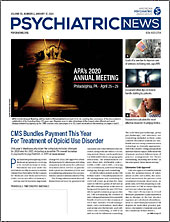“How can that insurance company deny psychiatric care? My patient has insurance coverage. She needs this treatment, or she’ll deteriorate—or die.”
Many psychiatrists have experienced this offense: an insurer’s utilization review department denies coverage for a covered psychiatric service that you had deemed medically necessary. You feel outraged. You feel helpless. But now, in 2020, you have reason to hope.
Why hope? Has something changed?
Yes, something has. The year 2019 was a game-changer for psychiatrists, the insurance industry, and psychiatric coverage determinations. Yet few psychiatrists fully appreciate what happened despite news stories, including those
here and
here.
The shake-up began in March 2019 when Chief Magistrate Judge Joseph C. Spero rendered his bombshell federal ruling in
David Wit, et al., v. United Behavioral Health (UBH). This class- action lawsuit, filed under the Employee Retirement Income Security Act (ERISA), includes over 50,000 UBH members and involves over 67,000 claims of wrongful denials of coverage. ERISA applies to over 140 million employees and their dependents around the country (
https://www.dol.gov/agencies/ebsa/laws-and-regulations/laws/erisa) and aims to protect all employee benefits, including health.
In his 106-page opinion, Judge Spero criticized UBH for using flawed, internally developed, and overly restrictive medical necessity guidelines that favored protecting the financial interests of UBH over medical treatment of its members.
“By a preponderance of the evidence,” Judge Spero wrote, “in each version of the Guidelines at issue in this case the defect is pervasive and results in a significantly narrower scope of coverage than is consistent with generally accepted standards of care.” His full decision can be accessed
here.
As of this writing, we are still awaiting Judge Spero’s remedies order (a court-ordered directive that requires specific actions, such as reparations) against UBH. Following that determination, we will know what UBH will be required to do to compensate class members who suffered damages (that is, protracted illness or death) or their beneficiaires as a result of UBH’s denial of their coverage claims.
But waiting for the remedies order does not prevent us from looking for answers to critical questions like these:
•
Will Wit. v. UBH impact the insurance industry enough to catalyze widespread reforms in how utilization review guidelines are determined and used?
•
How will the 50 offices of state insurance commissioners respond? Will these regulators mandate the use of clinical coverage guidelines that reflect the findings in Wit. v. UBH? Will they tighten their oversight with updated regulations and enforcement actions?
It may be tempting to dismiss this federal ruling as insufficient to make a dent in how utilization review is conducted. After all, this was an ERISA case, and Judge Spero’s decision relied on crucial components of ERISA, such as the fact that UBH violated the fiduciary duties it owed to its members. For non-ERISA insurance coverage requirements, such as “individual” and “fully insured” policies, the concept of a “fiduciary duty” does not exist. Therefore, some skeptics argue that the findings of this case are not likely to impact insurance industry practices substantially. However, of note is that UBH is a subsidiary of UnitedHealth Group, the largest health insurer in the United States. The optics of this cruel deceit are not kind. Therefore, many psychiatric advocates are hopeful that the implications of this federal court opinion may be far reaching enough to impact the entire U.S. insurance industry.
We are already beginning to see fresh signs of change. States are the entities that provide oversight and regulate the activities of the insurance industry. And at least one state—New York—has had a swift update to its insurance regulations.
On January 1, the New York State Office of Mental Health (OMH) adopted new provisions that require insurers to use evidence-based, peer-reviewed clinical review criteria that must be approved by the commissioner of the OMH as the basis for their utilization review guidelines. OMH stated that it is “committed to reviewing UR Agent clinical review criteria to ensure coverage determinations for mental health services are made in a manner consistent with accepted medical practices and federal and state behavioral health parity laws.” The document, “Guiding Principles for the Review and Approval of Clinical Review Criteria for Mental Health Services,” can be accessed
here.
Time will tell how those new regulations will be received and whether they will change the behavior of insurers like UBH. In the meantime, for practitioners like me, I am optimistic that ultimately this will mean fewer denials by insurers of medically necessary care.
I hope that, as psychiatrists, we will work state by state to make sure that state insurance commissioners are aware of Wit v. UBH. Consider the state in which you practice now. What is your state insurance commissioner doing to address how claims are denied in your state? Is your state legislator considering any new legislation? Reach out to and, better yet, get more involved with your APA district branch to engage its advocacy to ensure your state is doing all it can to guarantee that insurers are utilizing medical necessity guidelines that are fair and consistent with standard medical practice.
If we work to ensure that the insurance industry is held to the standard of the law, we will ensure that the treatment our patients need is not unfairly denied. We owe our patients nothing less. ■

